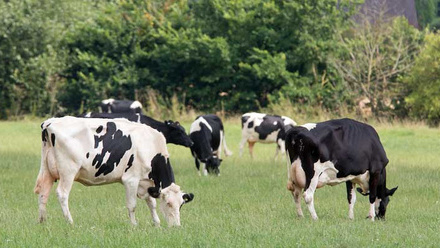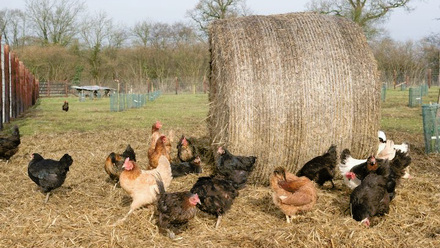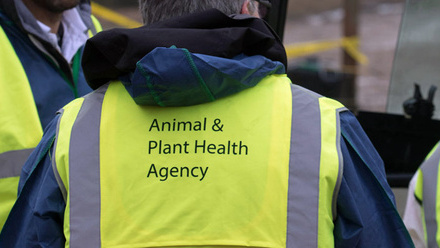Avian Influenza – Three cases confirmed at commercial premises in Aberdeenshire and Dumfries and Galloway
2023-0099
AIC would like to draw Members' attention to the following important communication from the Scottish Government today (17 August) regarding new outbreaks of Avian Influenza at commercial premises in Scotland.
AIC Members and scheme Participants are reminded of the importance of following the general biosecurity advice available on the AIC website [PDF], which covers movement on and off livestock farms, including game-rearing farms and shoots.
Read below for the latest communication from the Scottish Government, and see the attached information flyers for display in stores, distribution and sharing on social media as appropriate.
Latest from Scottish Government
Scotland’s Deputy Chief Veterinary Officer (CVO), Jesus Gallego, has confirmed that three commercial pheasant premises, two near Fraserburgh, Aberdeenshire and one near Kirkcudbright, Dumfries and Galloway, have tested positive for highly pathogenic avian influenza (HPAI) H5N1.
As a result, the Scottish Ministers have declared all three premises as infected premises (IP), and have implemented a 3km Protection Zone (PZ), and a 10km Surveillance Zone (SZ) in accordance with the Avian Influenza and Influenza of Avian Origin in Mammals (Scotland) Order 2006 and the Avian Influenza (H5N1 in Birds) (Miscellaneous Amendments etc.) (Scotland) Order 2021.
Note: During this outbreak season the first premises near Fraserburgh to be confirmed with HPAI H5N1 was declared on 12 January 2023. All restrictions were lifted on 02 April 2023.
AIV 2023 41 second premises near Fraserburgh, Aberdeenshire
In order to limit the further spread of disease, appropriate restrictions have been imposed. A PZ and SZ were declared and took effect at 21:03 on 14 August 2023. Within these zones, a range of different controls and restrictions are implemented.
These include restrictions on the movement of poultry, carcases, eggs, used poultry litter and manure. All birds on the site will be humanely euthanised for disease control and animal welfare purposes.
AIV 2023 42 third premises near Fraserburgh, Aberdeenshire
In order to limit further spread of disease, appropriate restrictions have been imposed. A PZ and SZ were declared and took effect at 21:03 on 14 August 2023. Within these zones, a range of different controls and restrictions are implemented. These include restrictions on the movement of poultry, carcases, eggs, used poultry litter and manure.
All birds on the site will be humanely euthanised for disease control and animal welfare purposes.
AIV 2023 43 near Kirkcudbright, Dumfries and Galloway
In order to limit the further spread of disease, appropriate restrictions have been imposed. A PZ and SZ were declared and took effect at 21:03 on 14 August 2023.
Within these zones, a range of different controls and restrictions are implemented. These include restrictions on the movement of poultry, carcases, eggs, used poultry litter and manure.
All birds on the site will be humanely euthanised for disease control and animal welfare purposes.
Outbreak Overview
As you may be aware, this is the 28th, 29th and 30th confirmed case of highly pathogenic avian influenza (HPAI) in Scotland since 01 October 2022.
These cases are part of a wider outbreak that has involved 197 cases of HPAI H5N1 across the UK since 01 October 2022:
- 158 in England
- 30 in Scotland
- 8 in Wales
- 1 in Northern Ireland
There has also been one case of low pathogenic avian influenza (LPAI H7N3) in Scotland.
The current risk of incursion of highly pathogenic avian influenza (HPAI) H5 infection in wild birds is at HIGH. The risk of poultry and captive bird exposure to HPAI H5 across Great Britain is at LOW with high uncertainty where biosecurity is sub-optimal, and with low uncertainty where stringent biosecurity measures are applied.
Advice for Keepers – Poultry and Other Captive Birds
Despite these cases, and following a national risk assessment, the risk of exposure to poultry and other captive birds from avian influenza H5 has been reduced to LOW across the UK.
As a result, the risk to poultry has now fallen to the level it was immediately before the introduction of the AIPZ in October 2022. On this basis, Scottish Ministers lifted the AIPZ on Tuesday 04 July 2023.
Further information can be found in this Declaration. This development has been mirrored by Defra (England) and the Welsh Government, and so the AIPZ has now been lifted across Great Britain simultaneously. To note, the AIPZ in Northern Ireland was lifted on 02 June 2023.
‘Low Risk’ does not mean ‘No Risk’
The AIPZ measures were designed to protect poultry and other captive bird premises from avian influenza, but the lifting of the AIPZ does not mean the risk of avian influenza has gone away for keepers of these birds, nor does it mean we will see no further confirmed cases at poultry or other captive bird premises in Scotland as the virus remains present in the environment.
Therefore, good biosecurity is still vital in ensuring that the spread of the virus is mitigated as much as possible, and bird keepers are encouraged to continue to implement the biosecurity measures within the current AIPZ and adopt these as best practice all year round.
The key biosecurity measures that can be applied are those that minimise direct or indirect contact with wild birds and your flock – in particular, contact with gull species is a particular risk at this time.
Given the unprecedented levels of infection across the UK during this outbreak season, and the continued uncertainty in terms of the risk of exposure to wild birds, the current restrictions on poultry shows and gatherings will remain in place.
Such gatherings, which involve Galliformes (chickens, turkeys, pheasants, partridges, quails and other land fowl) and kept Anseriformes (ducks, geese, swans and other waterfowl) are still considered to pose a fundamental concern for the spread of this virus amongst poultry. This measure is regularly reviewed.
Wild Birds
Wild birds can carry several diseases that are infectious to people, so do not touch or pick up any dead or visibly sick birds that you find.
In Great Britain, if you find at the same place at the same time:
- a single dead bird of prey, swan, goose or duck
- or five or more dead wild birds of any other species (including gulls)
They should be reported on the Report dead wild birds - GOV.UK webpage.
Alternatively, you can phone the GB helpline: 03459 33 55 77. It is advisable that any dead birds are not touched.
If you wish to submit a report without providing contact details, then the telephone helpline should be used. You must be 18 or over to use this service to report dead wild birds.
Sick or injured wild birds should be reported to the Scottish Society for the Prevention of Cruelty to Animals (SSPCA) in Scotland by telephone (03000 999 999).
Public Health
The risk to the general public’s health from avian influenza is still very low. However, the risk to people with intensive exposure to infected birds is considered to be low.
Food Standards Scotland advises that avian influenzas pose a very low food safety risk for consumers, and it does not affect the consumption of poultry products, including eggs.
Avian influenza is a notifiable animal disease. If you suspect any type of avian influenza in poultry or other captive birds you must report it immediately by contacting your local Animal and Plant Health Agency (APHA) Field Services Office. Failure to do so is an offence.
GB Poultry Register
In GB, you are legally required to register your birds if you keep more than 50. Keepers with less than 50 birds are strongly encouraged to register. It is also a legal requirement to notify APHA of any significant changes in the average number of birds kept.
Further advice for bird keepers can be found at www.gov.scot/avianinfluenza.







